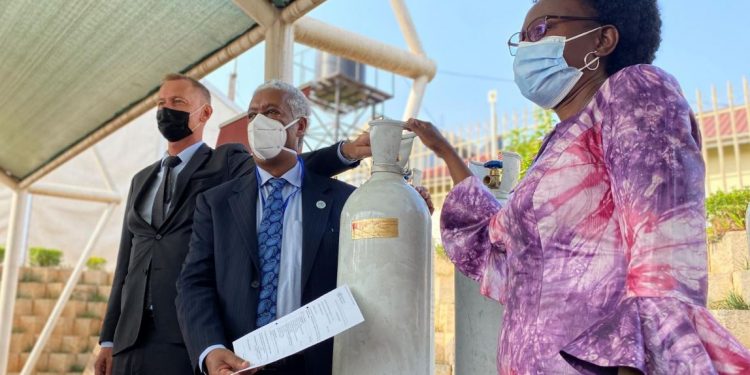Government has proposed value added tax (VAT) exemption on medical oxygen. This is under the Value Added Tax (Amendment) Bill, 2022 that is currently before parliament’s finance committee for scrutiny.
“Clause 4 seeks to amend the second schedule to the principal Act that lists supplies of goods and services that are exempt from VAT. It substitutes the paragraph related to oxygen cylinders with oxygen cylinder or oxygen for medical use,” reads part of the bill.
According to Henry Musasizi, the minister of state for Finance – General Duties, the Value Added Tax Act currently only exempts cylinders but not oxygen, and the proposed exemption is in a bid to make it affordable.
Musasizi also explains that the proposed law also seeks to remove the condition of a hospital at the level of a national referral to only benefit from VAT exemption on the supply of services to conduct a feasibility study, design and construction, the supply of locally produced materials for the construction of premises and other infrastructure, machinery and equipment or furnishings and fitting to a hospital facility developer.
According to Musasizi, the earlier exemption was intended to encourage the construction of hospitals but the exemption has remained redundant because of the condition of the construction hospitals at ‘the level of national referral’.
“The bill seeks to remove the condition of a hospital at the level of a national referral to encourage investment in hospitals that may not necessarily be at the level of a national referral,” he said.
Under the same proposed law, the government seeks to delete a paragraph that grants VAT exemption on the supply of menstrual cups. Musasizi explains that the bill seeks to move menstrual cups from the exempt schedule to the zero rate schedule for purposes of providing it the same VAT treatment as sanitary pads and tampons.
He says that the move will make menstrual cups affordable as the manufacturers are able to claim input VAT. Meanwhile, the government proposes a repeal of the exemption on the supply of cottonseed cake saying that this created an ambiguity in the law that created an impression that other animal feeds in seed cake form are not exempt except if they are expressly listed.
Musasizi notes that the proposed amendment seeks to treat all animal feeds as exempt. The government also seeks to remove VAT on the airport user charge imposed by the Uganda Civil Aviation Authority.
“The law does not exempt airport user service charges from VAT and these charges are included in the cost of the air ticket plus VAT. In a bid to make Uganda a competitive destination, the bill seeks to remove VAT on the user charge imposed by the Uganda Civil Aviation,” Musasizi explained.
The Value Added Tax (Amendment) Bill, 2022 is among the 9 tax bills that the government presented to parliament to support the next financial year’s budget funding. The others are the Income Tax (Amendment) Bill, 2022, the Stamp Duty Amendment Bill, Tax Procedures Code (Amendment) Bill, Excise Duty (Amendment) Bill, Tax Appeals Tribunal (Amendment) Bill, the Finance Bill, Traffic and Road Safety (Amendment) Bill and the Uganda Revenue Authority (Amendment) Bill.
Musasizi says that the proposed amendments to the various tax laws mainly provide clarifications of ambiguous provisions, close loopholes in the tax laws, and simplify the tax laws with a view of supporting tax administration and promoting voluntary taxpayer compliance, which will ultimately enhance revenue mobilization and collection.
Domestic revenues for the coming financial year 2022/2023 are projected to amount to Shs 25.54 trillion. Out of this, tax revenue is Shs 23.755 trillion and non-tax revenue (NTR) Shs 1.79 trillion.
The Finance Committee chaired by Kiboga East MP, Keffa Kiwanuka is expected to report to parliament about the proposed tax bills this week.











